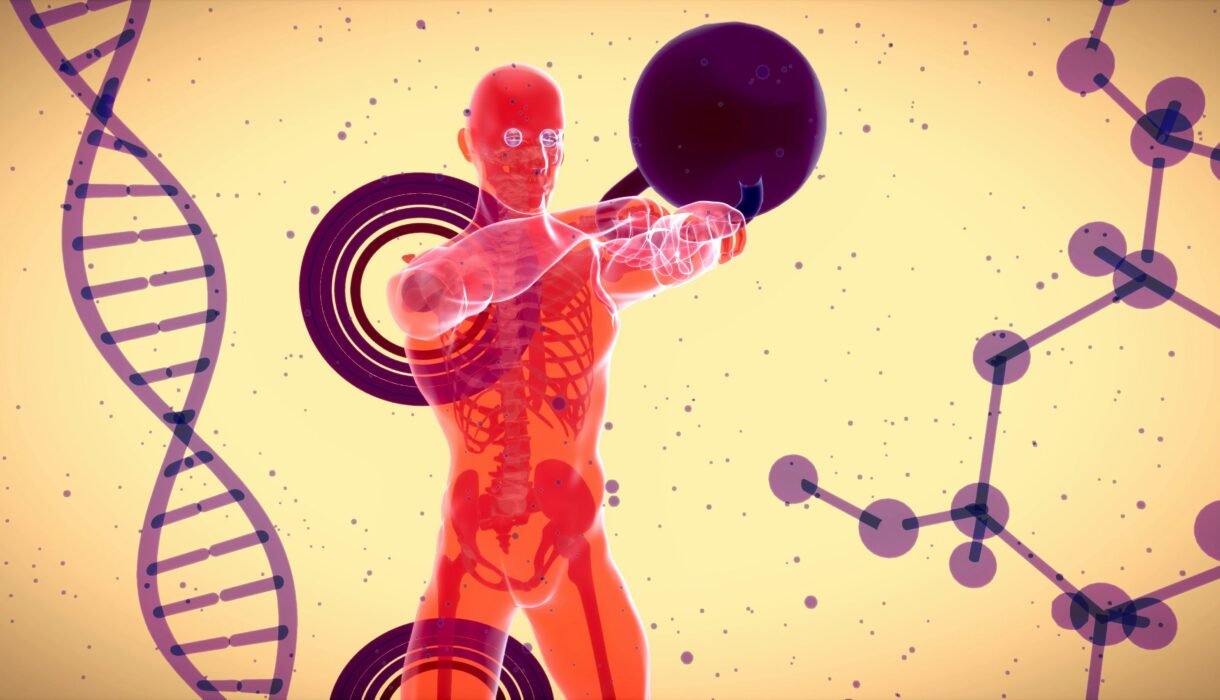
How to Deal with Finasteride Side Effects Using Natural Testosterone Boosters
Posted in :
Evidence-Based Key Insights by a Registered Pharmacist
Background
It was a warm summer day on July 1, 2020. I was a college student juggling online lectures, online assessments, and hair loss at the same time. It was a time when COVID-19 was in full swing, with a lot of fear and cases springing up everywhere. I had another problem on my mind. I was losing hair at the age of 19, which came as a shock to me, as I always thought Male Pattern Baldness (MPB) was a disorder of men in their 40s, but I was wrong to think that. Besides, dealing with finasteride side effects can be confusing and overwhelming, especially when you’re young and already anxious about hair loss. I had just started finasteride, a medication known to preserve hair, but also known for its side effects.
Here is my story of how I managed to keep my hair with finasteride while also tackling the horrible side effects associated with this medicine.
If you have been battling this dilemma of trading your sexual health for your hair or vice versa, then fear not. Give this blog a read; you might save your hair and libido.
What is Finasteride?
Finasteride has been approved by the FDA for the treatment of hair loss in men. Finasteride works by blocking the hormone responsible for the shrinking of your hair follicles, which results in thinner and wispy hair over time until you’re completely bald. The hormone in question is Dihydrotestosterone (DHT), which is made from the primary male hormone called Testosterone. Now we all know about testosterone, don’t we? It is an average gym bro’s buzzword. Testosterone is responsible for muscle growth, sex drive, brain function, and overall longevity of a man.
DHT is made from testosterone by an enzyme called 5-Alpha Reductase, and what finasteride does is block this enzyme, which causes the conversion of testosterone to DHT. As discussed in a 2000 Review Article published in European Urology, 5-Alpha Reductase inhibitors like finasteride suppress DHT by up to 70% in serum (Bartsch et al., 2000)
But DHT is not a villain; it’s a natural hormone required for sexual health, mental health, and overall well-being. Suppressing a natural hormone by up to 70% is bound to cause some side effects.
Common Side Effects of Finasteride
Alright. Many users tolerate finasteride very well without side effects, as the risk of side effects is only up to 1% to 10% of users, but if you are someone like me who overthinks a lot, then you can give yourself a nocebo effect (In simple terms, The nocebo effect is when expecting a bad outcome makes you feel bad even if the treatment isn’t harmful at all)
The listed side effects of finasteride are:
- Erectile dysfunction (1.3-8.1%)
- Decrease libido (1.8-6.4%)
- Breast enlargement (0.5-1.8%)
- Ejaculation disorder (0.8-1.2%)
- Nervous system/psychiatric: Depression, suicidal ideation, and behavior (Rare) (Source: Medscape)
Most guys are not lucky enough to avoid these side effects, especially with the kind of lifestyle we all have. You might find your gym performance dwindle, motivation at an all-time low, fatigue, and mood swings that could crush you on a day-to-day basis.
So what’s the solution, you might ask?
Natural Ways to Manage Finasteride Side Effects: With Testosterone Boosters
Only up to 10% of finasteride users experience side effects, and side effects are more prevalent in men with lower testosterone levels and Finasteride itself lowers testosterone levels as long-term use of finasteride has been shown to reduce total testosterone levels, potentially contributing to symptoms of hypogonadism in some men(Traish et al., 2015)
Testosterone can be boosted by both lifestyle modification as well as supplements. That’s where Testosterone Boosters come into play. Many supplements are available in the market for boosting testosterone levels in men, but they all contain these common ingredients:
- Tongkat Ali Extract (Eurycoma Longifolia), also called Longjack
- Tribulus Terrestris Extract
- L-Arginine
- L-Citrulline
- Ginseng
- Ginkgo biloba
- Ashwagandha
- Fadogia agrestis
Tongkat Ali and Tribulus Terrestris
In the natural testosterone boosters category, Tongkat Ali and Tribulus Terrestris reign the kingdom. A study demonstrated that 200 mg of Tongkat Ali greatly improved serum testosterone levels, reduced fatigue, and enhanced quality of life in men within just two weeks (Chinnappan et al., 2021). Similarly, Tribulus Terrestris has also been shown to increase testosterone levels and enhance erectile function in men (GamalEl Din et al., 2019).
Pharmacist Insights:
Start with low doses and see where it takes you. Some people respond well to even low doses (70 mg to 80 mg). Consult your Physician for dose titrations. The key here is to balance the benefits of finasteride while managing the side effects.
L-Arginine and L-Citrulline
L-Arginine and L-Citrulline are amino acids that enhance blood flow as they boost Nitric Oxide production in the body. Healthy erectile function needs good blood flow; these amino acids optimize vascular health to promote healthy circulation in the body. According to studies, while L-Arginine offers short-term improvements, Citrulline may sustain nitric oxide better and support long-term vascular health. In one trial, L-citrulline supplementation improved erection hardness in men with mild erectile dysfunction (Cormio et al., 2011).
Pharmacist Insights
These compounds can cause low blood pressure if consumed in excess or if used in conjunction with Topical Minoxidil 5% solution. (Another FDA-approved treatment for baldness in men). Consult your physician if you experience low blood pressure or dizziness.
Ginseng and Ginkgo Biloba
Panax Ginseng, also known as Korean Ginseng, is a natural aphrodisiac herb known for centuries and has been used to enhance erectile function, libido, and energy in men, especially when the cause is stress-related. Stress increases cortisol (a Stress Hormone), which reduces testosterone in a feedback loop. Ginkgo biloba, although better known for cognitive support, may also improve sexual function by enhancing blood flow. In a 2023 Meta-Analysis Systematic Review of dietary supplements used to treat Erectile Dysfunction, it was found that “Nutraceuticals, such as Panax ginseng, Tribulus terrestris, and L-arginine, that are able to improve male sexual function” (Petre et al., 2023).
Pharmacist Insights:
Some precautions need to be taken when using these compounds:
Panax Ginseng: It may cause trouble sleeping and increase the risk of bleeding, and it should never be used in people who have heart disease, autoimmune disorders, or bleeding disorders. (Source: WebMD)
Ginkgo Biloba: It increases the risk of seizures in epileptic patients. Therefore, it’s better to avoid this supplement in such scenarios. It also increases the risk of bleeding; better to avoid this supplement in bleeding disorders or before surgery. (Source: MayoClinic)
Ashwagandha and Fadogia Agrestis
Ashwagandha is an adaptogen (helps the body cope with stress). Therefore, it helps increase the testosterone levels in men by the same Cortisol-Testosterone feedback loop. A 2015 study found that Ashwagandha supplementation increased testosterone and muscle strength in healthy males undergoing resistance training (Wankhede et al., 2015).
Fadogia Agrestis is popular in fitness groups as a proposed testosterone booster, but quality human research is still lacking regarding its claims to boost testosterone levels in men.
Pharmacist Insights
Ashwagandha can cause dizziness, an upset stomach, and in rare cases, liver injury. (Source: NIH). Meanwhile, Fadogia Agrestis should be used with caution since there is no real data available for its supposed claims.
⚠️ Disclaimer:
These natural compounds can complement pharmaceutical treatments, but you should always consult your GP before beginning any supplement, especially if you’re already managing hormonal conditions like low testosterone or are on prescription medications such as Finasteride.
Natural Ways to Boost Testosterone
Well, that’s enough about herbal supplements now. Let’s dive into something which we all can do, and a bonus point, there are no supplements required for that
Strength Training
Weight-lifting exercises, particularly compound movements such as bench press, deadlifts, and squats, naturally stimulate testosterone production.
High Protein and a Balanced Diet
Eggs, Lean meats such as poultry, healthy fats (Nuts, Seeds, Olive Oil, and Nut Butters) can also help provide healthy nutrients that support testosterone levels. Also, you should limit processed foods and sugar intake to avoid inflammation in the body.
Quality Sleep
Strive for 8 to 9 hours of uninterrupted deep sleep as testosterone production peaks during deep sleep.
Stress Management
As discussed already, High stress levels increase cortisol, which suppresses testosterone levels. Try mindfulness, meditation, Yoga, or a brisk walk in nature.
Healthy Body Fat Levels
Excess body fat, especially belly fat, is linked to lower levels of testosterone in men. A leaner physique will support optimum hormonal balance.
Conclusion
There you have it, this is how I saved my hair, along with my hormonal health, over the past 5 years. I survived college without going bald and without losing my mind. Answers were not always served on a silver platter to me; I had to do deep research on what works and what doesn’t.
Managing the side effects of finasteride doesn’t always mean stopping treatment. With the right balance of natural testosterone boosters, lifestyle habits, and professional guidance, you can support your hormones and well-being effectively. We must always prioritize evidence-based approaches, and remember, your health journey is personal. Make informed choices, stay consistent, and trust the process.
My Personal Journey
Here’s a glimpse into my transformation.
I struggled with hair thinning and hormonal imbalance, but with consistency and smart choices, the results speak for themselves.
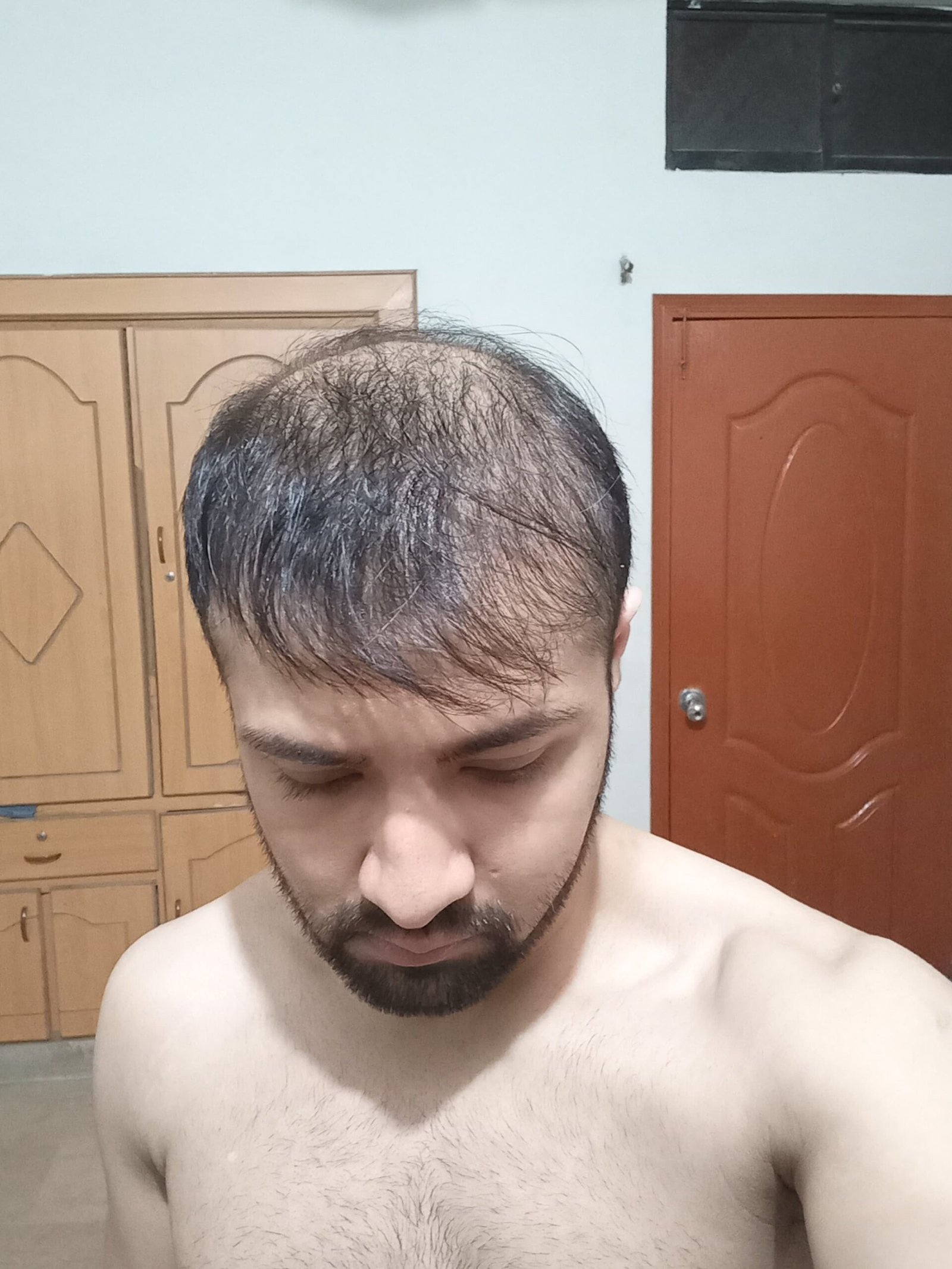
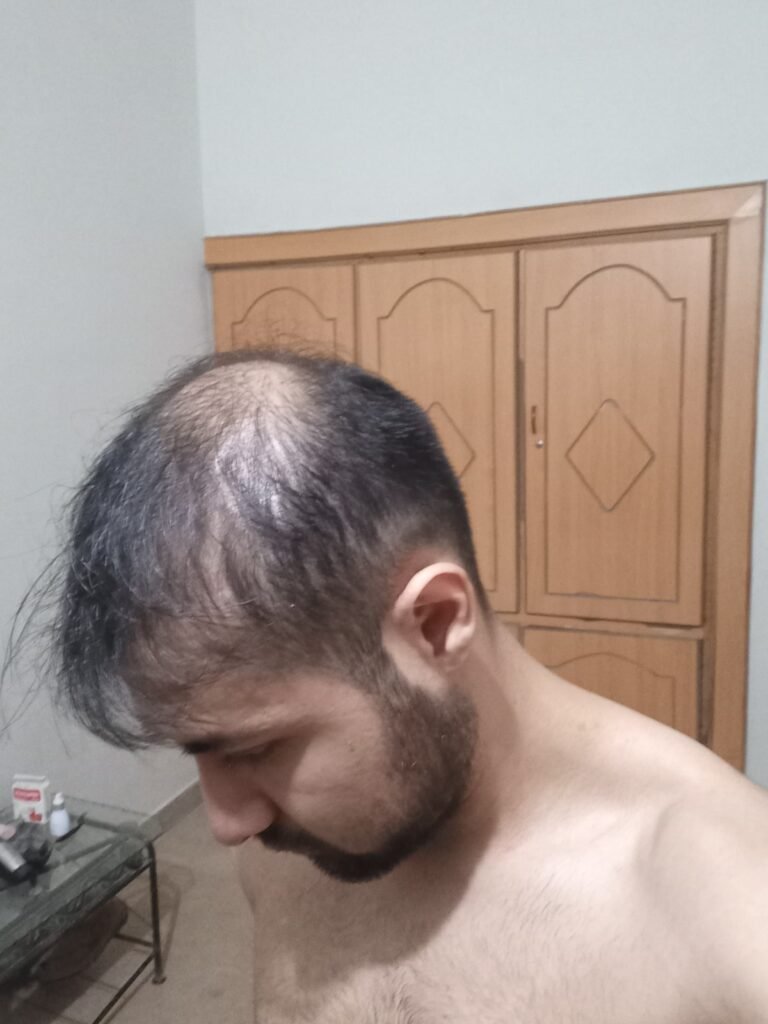



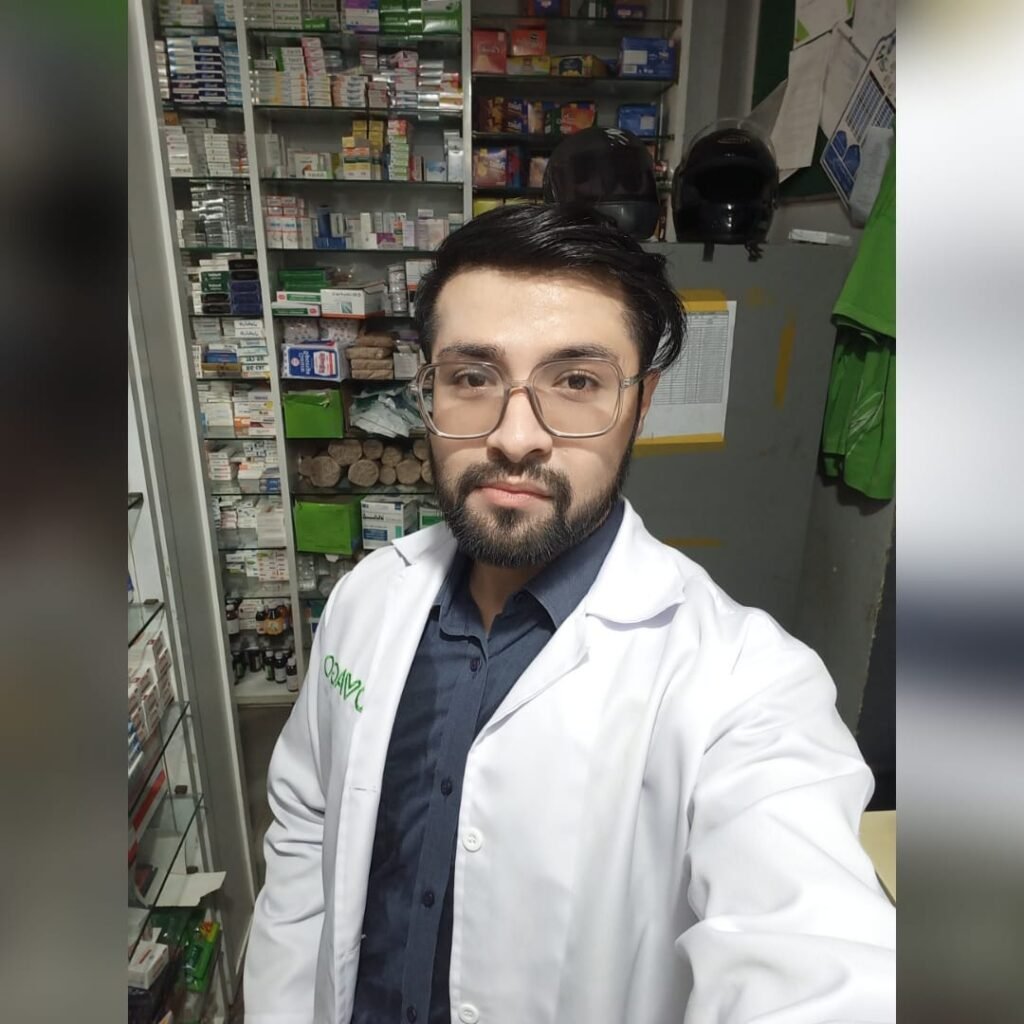
Serum Testosterone Report
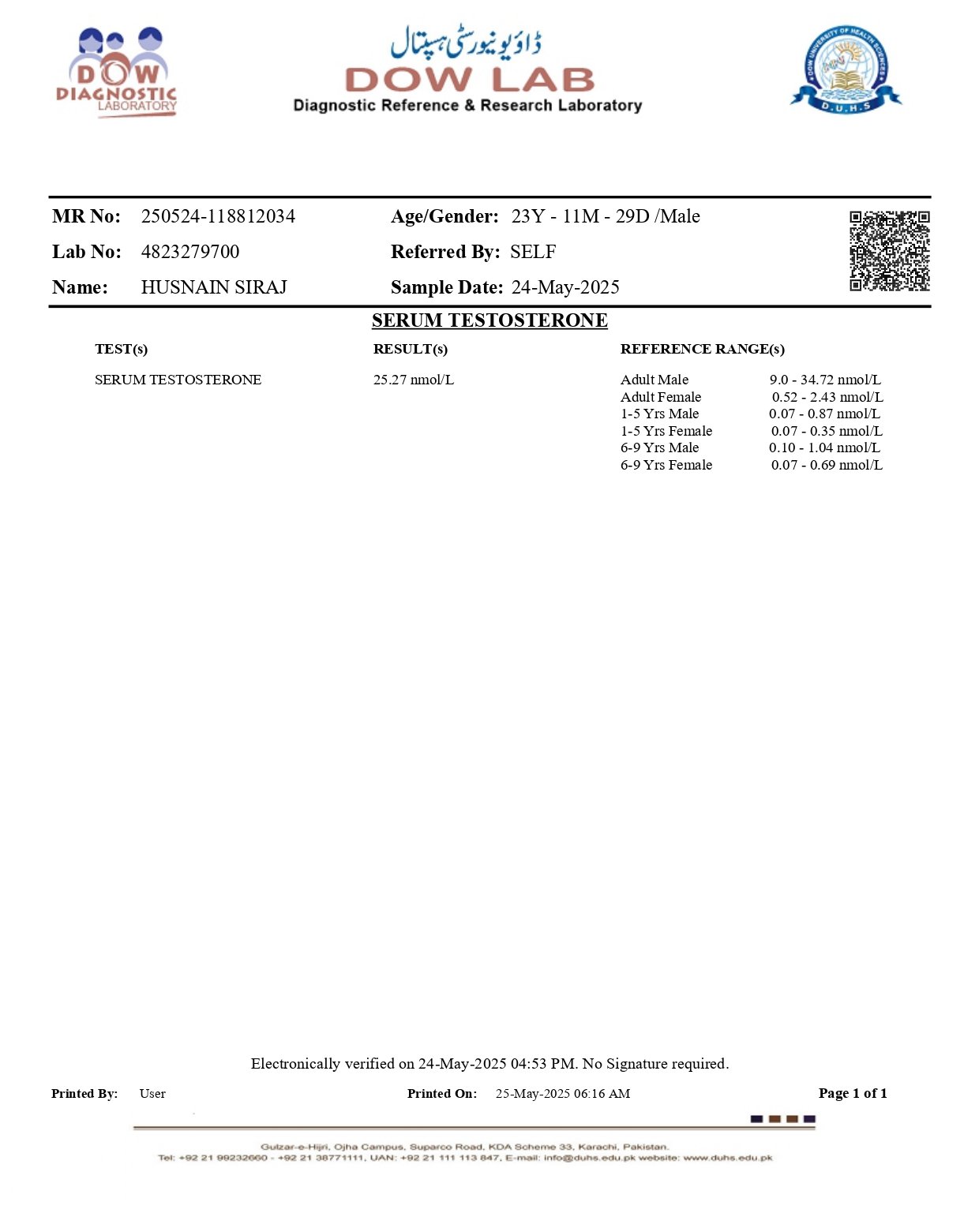
Interpretation
Current Level: 25.27 nmol/L, which is equivalent to 728.84 ng/dl, achieved through a combination of medical therapy, natural supplements, and lifestyle changes.
Normal testosterone levels in adult men range from 265 to 923 nanograms per deciliter of testosterone (ng/dL) in their blood. (Source: MedicalNewsToday)
Supplements Recommendations
Everyone’s body is different. The right testosterone booster depends on your hormones, stress, lifestyle, and goals.
Email me or connect on LinkedIn for a personalized supplement recommendation backed by research and experience.
References
Research Articles
- G Bartsch, R. S. R., H Klocker (2000). “Dihydrotestosterone and the concept of 5alpha-reductase inhibition in human benign prostatic hyperplasia.” European Urology 37(4): 367-380.
- Traish, A. M., et al. (2015). “Finasteride, not tamsulosin, increases severity of erectile dysfunction and decreases testosterone levels in men with benign prostatic hyperplasia.” Hormone Molecular Biology and Clinical Investigation 23(3): 85-96.
- Chinnappan, S. M., et al. (2021). “Effect of Eurycoma longifolia standardised aqueous root extract–Physta® on testosterone levels and quality of life in ageing male subjects: a randomised, double-blind, placebo-controlled multicentre study.” Food & nutrition research 65: 10.29219/fnr. v29265. 25647.
- GamalEl Din, S. F., et al. (2019). “Tribulus terrestris versus placebo in the treatment of erectile dysfunction and lower urinary tract symptoms in patients with late-onset hypogonadism: a placebo-controlled study.” Urologia Journal 86(2): 74-78.
- Cormio, L., et al. (2011). “Oral L-citrulline supplementation improves erection hardness in men with mild erectile dysfunction.” Urology 77(1): 119-122.
- Petre, G. C., et al. (2023). “Dietary supplements for erectile dysfunction: analysis of marketed products, systematic review, meta-analysis and rational use.” Nutrients 15(17): 3677.
- Wankhede, S., et al. (2015). “Examining the effect of Withania somnifera supplementation on muscle strength and recovery: a randomized controlled trial.” Journal of the International Society of Sports Nutrition 12: 1-11.
Websites
- Cleveland Clinic. Male Pattern Baldness (Androgenic Alopecia). Accessed June 20, 2025.
- Drugs.com. Finasteride – Uses, Side Effects, Warnings. Accessed June 20, 2025.
- Healthline. What Is Testosterone?. Accessed June 20, 2025.
- Medscape. Finasteride (Propecia, Proscar) – Drug Reference. Accessed June 20, 2025.
- Examine. L-Arginine – Scientific Research Summary. Accessed June 20, 2025.
- Cleveland Clinic. Cortisol: What It Is, How It Affects the Body. Accessed June 20, 2025.
- WebMD. Panax Ginseng – Uses, Side Effects, and More. Accessed June 20, 2025.
- Mayo Clinic. Ginkgo Biloba – Cautions and Side Effects. Accessed June 20, 2025.
- Examine. Fadogia Agrestis – Supplement Overview. Accessed June 20, 2025.
- NCCIH (NIH). Ashwagandha – Health Benefits and Risks. Accessed June 20, 2025.
- DrRxWrites. What Lowers Testosterone the Most? Lifestyle Health Guide. Accessed June 20, 2025.
- Medical News Today. Typical Testosterone Levels in Males and Females. Accessed June 20, 2025.
Dr. Hasnain Siraj Memon is a Doctor of Pharmacy (Pharm D), medical content creator, and the founder of DrRxWrites. With a strong foundation in clinical pharmacy and a creative eye for storytelling, he transforms complex medical and wellness topics into accessible, evidence-based content for both professionals and the general public.
His writing is guided by a passion for accuracy, empathy, and public education helping readers make informed decisions about their health, habits, and healing. Whether he’s explaining pharmacology or sharing life lessons from the hospital ward, Hasnain brings clarity and heart to every piece.
He’s currently building a library of wellness content while offering freelance writing services in medical blogging, drug reviews, SEO optimization, and patient education materials.



